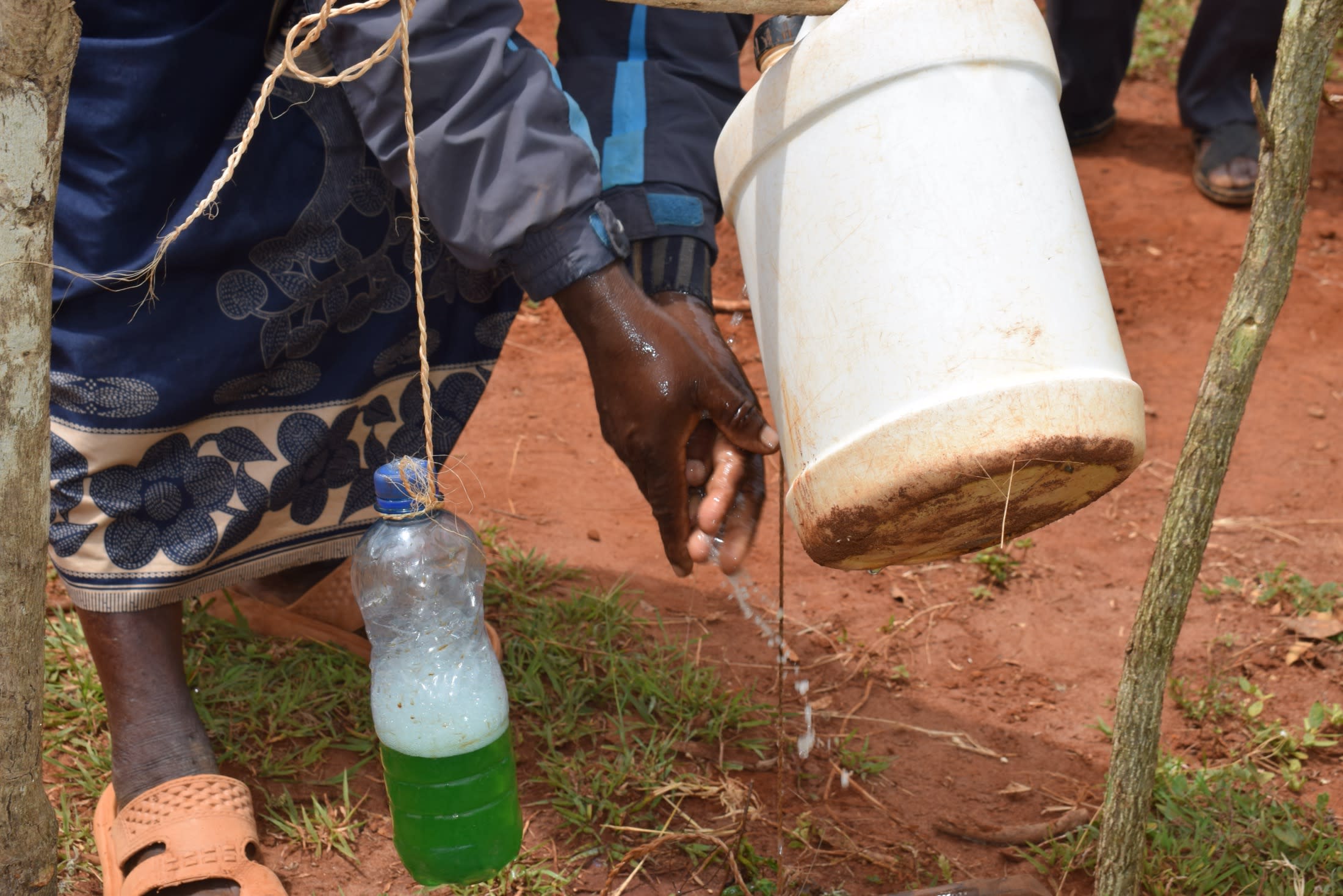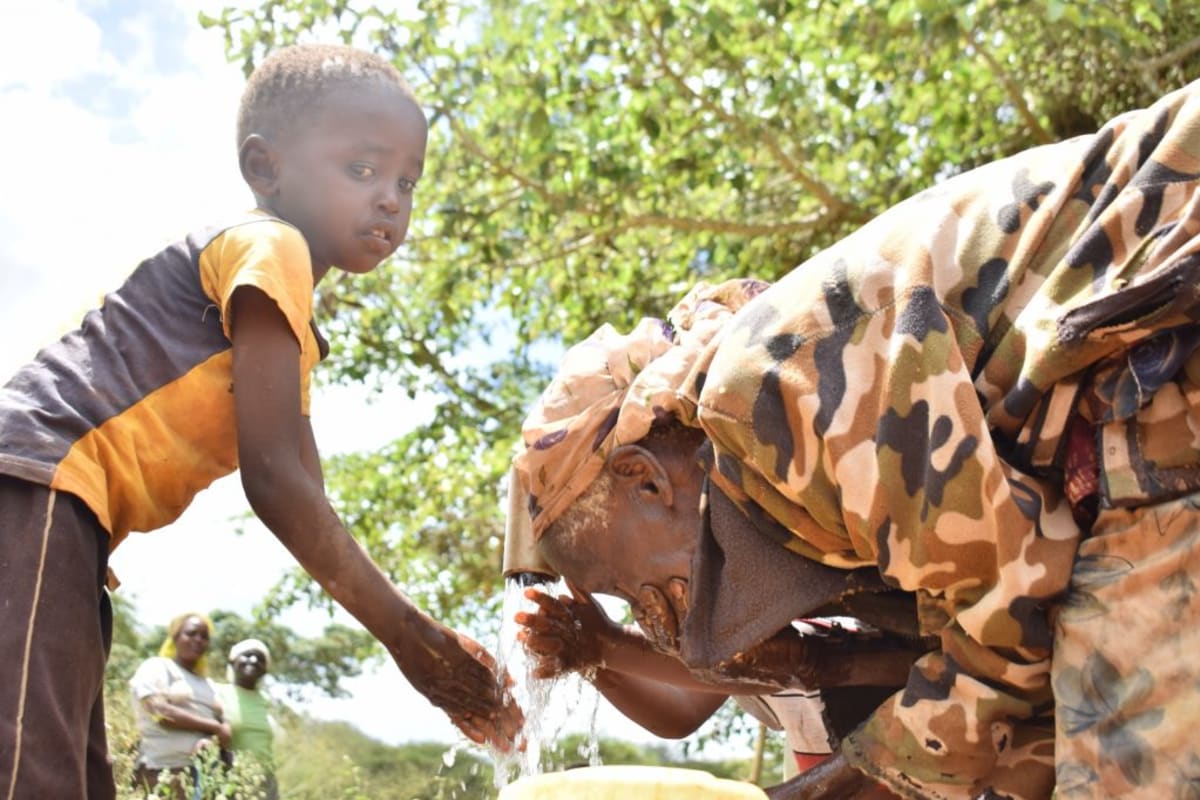Project Updates
May, 2020: COVID-19 Prevention Training Update at Mbuuni Community
Our teams are working on the frontlines of the COVID-19 pandemic. Join us in our fight against the virus while maintaining access to clean, reliable water.
We are carrying out awareness and prevention trainings on the virus in every community we serve. Very often, our teams are the first (and only) to bring news and information of the virus to rural communities like Mbuuni, Kenya.
During our training, we met Janet Mutuku, a 44-year-old teacher who lives in the community.

Janet Mutuku
She shared with us the challenges she faces during the COVID-19 pandemic. She is not working right now since the schools are closed across Kenya. That has made her life more difficult. However, the set of sand dams and hand-dug wells that her self-help group constructed over the past few years is something Janet can rely on.
“Having a well and sand dam project at this time has been a great blessing and we are very grateful for the support granted by The Water Project. Times are hard and having a reliable source of water is very advantageous," she said.

Fetching water from one of the Mbuuni wells, before COVID-19 pandemic.
We trained community members on the symptoms, transmission routes, and prevention of COVID-19.
Due to public gathering concerns, we worked with trusted community leaders to gather a select group of community members who would then relay the information learned to the rest of their family and friends.
We covered essential hygiene lessons:
- Demonstrations on how to build a simple handwashing station
- Proper handwashing technique
- The importance of using soap and clean water for handwashing
- Cleaning and disinfecting commonly touched surfaces including at the water point.
We covered COVID-19-specific guidance in line with national and international standards:
- Information on the symptoms and transmission routes of COVID-19
- What social distancing is and how to practice it
- How to cough into an elbow
- Alternative ways to greet people without handshakes, fist bumps, etc.
- How to make and properly wear a facemask.
During training, we installed a new handwashing station with soap near the community’s water point.

Handwashing station
"We are expected to wash our hands frequently and this has been possible because our projects have been providing an abundant supply of water,” Janet said.
Due to the rampant spread of misinformation about COVID-19, we also dedicated time to a question and answer session to help debunk rumors about the disease and provide extra information where needed.
Water access, sanitation, and hygiene are at the crux of disease prevention. You can directly support our work on the frontlines of COVID-19 prevention in all of the communities we serve while maintaining their access to safe, clean, and reliable water.

October, 2019: Giving Update: Mbuuni Community E
A year ago, your generous donation helped Mbuuni Community in Kenya access clean water.
There’s an incredible community of monthly donors who have come alongside you in supporting clean water in Mbuuni Community. Month after month, their giving supports ongoing sustainability programs that help this community maintain access to safe, reliable water. Read more…

October, 2018: Mbuuni Community Hand-Dug Well Complete
Mbuuni Community, Kenya now has a new source of water thanks to your donation. A new hand-dug well was constructed adjacent to a sand dam. The dam will build up sand to raise the water table and naturally filter water. Community members also attended hygiene and sanitation training, and plan to share what they learned with their families and neighbors.
New Knowledge
The first hygiene and sanitation training done for this area was in March 2017. The training sessions held after the first are intended to cover weaknesses we notice during household visits. After a follow-up conducted in July 2017, there was a clear need for a review because very little had been achieved by the group members. So another training was scheduled for 2018.

Reviewing the group’s progress in establishing good sanitation facilities at home.
Training was in the homestead of Gideon Kiilu and attended by 210 group members over the course of a few days. It was very sunny during training, so everyone kept shifting their chairs around to be in the shade.
We informed group members of different ways to treat water. They were very curious about learning the pros and cons of each method.
As for weaknesses, we realized the majority of latrines had open pits that allowed odors to escape and flies to enter. For new content, we taught group members how to make their own soap. Many members had already been mixing their own soap but admitted that after a few days it would spoil and have to be thrown away.
This session was particularly interesting for group members who wanted to fix their process and produce good soup for sale.

“According to how group members expressed interest in the training, I think it will change our lives,” 70-year-old Gideon Kiilu said.
“For instance, on the issue of diseases, we have learned how we can prevent waterborne diseases. That knowledge will help us. We have also learned about making soap, which is a very important activity. It will help us change our hygiene standards and increase incomes.”
Hand-Dug Well
We delivered the experts and materials, but the community helped get an extraordinary amount of work done. They collected local materials to supplement the project, including sand and water.

A hole seven feet in diameter is excavated up to a recommended depth of 25 feet. (Most hand-dug wells don’t reach that depth due to the existence of hard rocks between 10-18 ft.).
At this point, heavy rains delayed any progress. The excavated well filled up with water before the lining was finished. The group patiently waited until the rains subsided, after which they could bail the well with a bucket and rope system.

The diameter then shrinks to five feet when construction of the hand-dug well lining is completed. This lining is made of brick and mortar with perforations to allow for water to seep through. Sand builds up around the well walls and will naturally filter the rainwater that’s stored behind the dam.
Once the construction of the lining reaches ground level, a precast concrete slab is laid on top and joined to the wall using mortar. Four bolts for the hand-pump are fixed on the slab during casting. The mechanics arrive to install the pump as community members watch, learning how to manage and maintain the pump for themselves.
The pump was installed level with the top of the sand dam (click here to see that project) because as the dam matures, sand will build up to the top of the wall. We wouldn’t want the pump to be buried by sand!
The well is then left for a few days after installing the pump to allow the joints to completely dry. Communities pump out the water that seeps into the well after it rains for the first time since it needs to be cleaned out after construction.

"Mbuuni Community is very much happy with this project. Cumulatively, we have now implemented three water projects in different corners of the village and many people have unlimited access to water for household use," said Mr. Gedion Kiilu.
"And further, water which can be used for farming to earn community income and improve food security. It is the joy of everyone being part of this exciting generation."

June, 2018: Rain Delay in Mbuuni Community
Hand-dug well and sand dam systems throughout Machakos County have recently benefited from seasonal rains that only come once or twice a year. When a hand-dug well is still under construction, the rain isn't as helpful! The well in Mbuuni Community was being dug during these torrential downpours, and the hole filled up with mud before it could be covered. The community and our artisans are starting the excavation process over again, and asked for some extra time to persevere.
Thank You for standing with Mbuuni Community as we work together to deliver clean water!
April, 2018: Mbuuni Community's Well Underway
A severe clean water shortage still affects families living in Mbuuni Community. Families are having to walk long distances to find clean water, wasting hours of time and tons of energy. Thanks to your generosity, we’re working to install a clean water point nearby and much more.
Get to know your community through the introduction and pictures we’ve posted, and read about this water, sanitation and hygiene project. We look forward to reaching out with more good news!

 Protected Dug Well
Protected Dug Well
 Rehabilitation Project
Rehabilitation Project





























